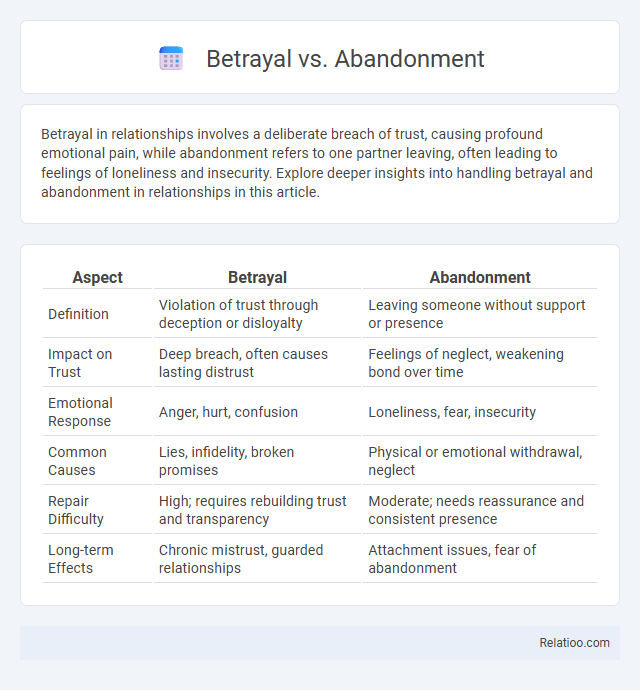Betrayal in relationships involves a deliberate breach of trust, causing profound emotional pain, while abandonment refers to one partner leaving, often leading to feelings of loneliness and insecurity. Explore deeper insights into handling betrayal and abandonment in relationships in this article.
Table of Comparison
| Aspect | Betrayal | Abandonment |
|---|---|---|
| Definition | Violation of trust through deception or disloyalty | Leaving someone without support or presence |
| Impact on Trust | Deep breach, often causes lasting distrust | Feelings of neglect, weakening bond over time |
| Emotional Response | Anger, hurt, confusion | Loneliness, fear, insecurity |
| Common Causes | Lies, infidelity, broken promises | Physical or emotional withdrawal, neglect |
| Repair Difficulty | High; requires rebuilding trust and transparency | Moderate; needs reassurance and consistent presence |
| Long-term Effects | Chronic mistrust, guarded relationships | Attachment issues, fear of abandonment |
Understanding Betrayal and Abandonment
Understanding betrayal requires recognizing it as a breach of trust where someone intentionally violates your expectations or loyalty, often causing deep emotional wounds. Abandonment, by contrast, involves someone leaving or withdrawing support, creating feelings of neglect and insecurity in your life. Differentiating these experiences helps you address and heal from the specific pain associated with either betrayal or abandonment.
Key Differences Between Betrayal and Abandonment
Betrayal involves a breach of trust where someone intentionally harms or deceives you, while abandonment refers to the act of leaving someone without support or care, often causing feelings of neglect. Key differences include the intent behind the actions--betrayal is driven by deceit or disloyalty, whereas abandonment is characterized by physical or emotional withdrawal. Understanding these nuances helps you recognize the specific impact each can have on relationships and emotional healing.
Psychological Impact of Betrayal
Betrayal induces profound psychological trauma characterized by feelings of shock, deep hurt, and erosion of trust, often leading to long-term emotional distress and anxiety disorders. Unlike abandonment, which primarily triggers fear of loss and loneliness, betrayal attacks the foundational trust in relationships, causing cognitive dissonance and identity confusion. The intense emotional turmoil from betrayal can manifest in symptoms such as depression, post-traumatic stress, and difficulties in forming future attachments.
Emotional Consequences of Abandonment
Emotional consequences of abandonment often include deep feelings of insecurity, low self-esteem, and chronic anxiety, which can severely impact your ability to form trusting relationships. Unlike betrayal, which typically involves a specific breach of trust by someone close, abandonment triggers a pervasive fear of being left alone or unloved, leading to emotional withdrawal or attachment issues. Understanding these emotional outcomes is crucial for healing and developing healthier emotional resilience after experiencing abandonment.
Signs You’ve Been Betrayed vs. Abandoned
Signs you've been betrayed include broken trust, deceitful behavior, and intentional harm that creates deep emotional wounds, often leaving you feeling shocked and confused. Abandonment signals involve a persistent sense of neglect, withdrawal, or emotional unavailability that causes feelings of loneliness and insecurity. Recognizing the difference lies in understanding betrayal as an active violation of loyalty, while abandonment reflects a passive or sudden absence of support and care.
Common Scenarios of Betrayal and Abandonment
Common scenarios of betrayal often involve broken trust in relationships, such as infidelity, deception, or intentional harm by someone close. Abandonment frequently occurs when a person is physically or emotionally left behind, commonly seen in situations like parental neglect, sudden relationship breakup, or desertion during crises. Both betrayal and abandonment trigger deep emotional wounds related to trust, security, and attachment, significantly impacting mental health and well-being.
Coping Mechanisms for Betrayal and Abandonment
Coping with betrayal and abandonment requires acknowledging the emotional trauma and fostering self-compassion to rebuild trust and resilience. Techniques such as setting healthy boundaries, seeking therapy, and practicing mindfulness help you process complex feelings and prevent long-term psychological harm. Empower your healing journey by cultivating supportive relationships and developing constructive communication skills to overcome feelings of betrayal and abandonment.
Healing and Recovery Strategies
Healing from betrayal involves rebuilding trust through open communication, setting clear boundaries, and seeking professional therapy to address emotional wounds. Recovery from abandonment centers on developing self-worth, practicing self-compassion, and engaging in supportive relationships to overcome feelings of rejection. Effective strategies for both trauma types include mindfulness practices, emotional regulation techniques, and consistent support from counselors or support groups.
Rebuilding Trust After Betrayal or Abandonment
Rebuilding trust after betrayal or abandonment requires consistent actions that demonstrate reliability and honesty to heal emotional wounds. You must prioritize open communication and empathy to address feelings of hurt and insecurity effectively. Establishing new patterns of trust begins with transparency and a genuine commitment to making amends.
Prevention and Moving Forward in Relationships
Preventing betrayal, abandonment, and rejection in relationships requires clear communication, consistent trust-building, and emotional transparency to address issues before they escalate. Understanding the subtle differences--betrayal involves a breach of trust, abandonment is the withdrawal of support, and rejection is the denial of acceptance--helps you set healthy boundaries and expectations. Moving forward, fostering forgiveness, seeking professional support, and prioritizing mutual respect empower your relationship to heal and grow stronger.

Infographic: Betrayal vs Abandonment
 relatioo.com
relatioo.com